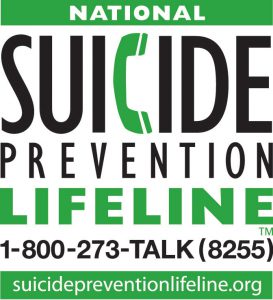Losing someone you love is a major trauma that no matter what, we are never truly prepared for. It’s completely normal to have feelings of severe shock, depression, anger, and hopelessness. Your emotions following a major loss may be unpredictable and you may feel that you are having a hard time controlling them. It’s important to know that you have every right to feel all the elements of extreme grief.
It’s equally important to know that these feelings, however strong, will pass. You are not alone and your life is worth more than you can know right now. If you’re having suicidal thoughts, you should immediately talk to someone about them. If you have a close friend, family member, or clergy leader that you trust, call them. It doesn’t matter what time it is – they love you and will be more than happy to talk about your feelings.
If you prefer to speak to someone else, dial 1-800-273-8255. This is the number for the National Suicide Prevention Lifeline. There will always be someone to talk with you, compassionately, 24/7/365. Everything you say on the lifeline is 100% confidential. You can also contact The Hope Line via a mobile app. If you prefer not to talk live, you can try the Crisis Text Line. Just text 741741.
Suicide is a permanent response to a temporary problem. It is never the answer.
In order to help stave off thoughts of suicide in the future, you need to know how to begin to manage and eventually overcome your feelings of intense grief. Harvard Health states that you can expect your grief to wax and wane – it may be intense one day and not so much the next. You can expect to feel depression during periods of grief. It is normal to have problems sleeping, extreme melancholy, and a loss of appetite. It’s normal to feel bad following the loss of someone you love, but you should know that there are ways to help manage it. There is hope.
Do everything you can to resist becoming isolated. Schedule time with friends and family. Lean on your neighbors or church community. Attend social events. Join group activities.
Talk to a professional. You should always feel free to discuss your feelings with your friends and family, but professional therapists and grief counselors are trained to help you cope with the specific sort of sadness and despair that follows a loss.
Take care of yourself. A healthy body is key for a healthy mind, and a healthy mind is one that can better manage intense emotions following a loss. Focus on eating a healthy diet and getting at least 30 minutes of moderate exercise daily. Not only will this help you to stay healthy, but it will also give you something to take your mind off your grief. Distractions (healthy ones, of course) are actually a helpful tool in overcoming depression of all kinds.
No matter how dark it may seem right now, there is always light at the end of the tunnel. There is no grief too powerful that time cannot heal. Suicide removes every chance of you moving forward and living a healthy, happy life – something that your loved one would certainly have wanted for you. Stay strong. It gets better.




